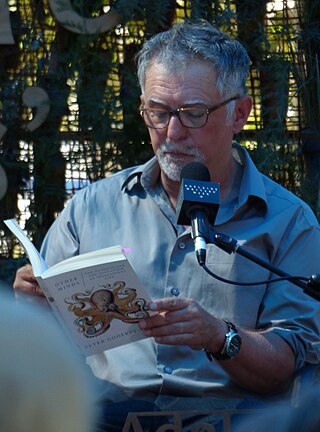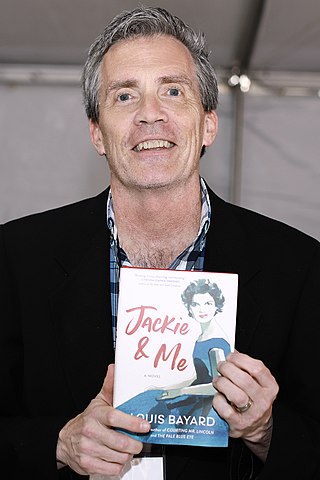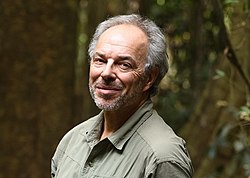
The wandering albatross, snowy albatross, white-winged albatross or goonie is a large seabird from the family Diomedeidae, which has a circumpolar range in the Southern Ocean. It was the last species of albatross to be described, and was long considered the same species as the Tristan albatross and the Antipodean albatross. A few authors still consider them all subspecies of the same species. The SACC has a proposal on the table to split this species, and BirdLife International has already split it. Together with the Amsterdam albatross, it forms the wandering albatross species complex.
The Aubrey–Maturin series is a sequence of nautical historical novels—20 completed and one unfinished—by English author Patrick O'Brian, set during the Napoleonic Wars and centring on the friendship between Captain Jack Aubrey of the Royal Navy and his ship's surgeon Stephen Maturin, a physician, natural philosopher, and intelligence agent. The first novel, Master and Commander, was published in 1969 and the last finished novel in 1999. The 21st novel of the series, left unfinished at O'Brian's death in 2000, appeared in print in late 2004. The series received considerable international acclaim, and most of the novels reached The New York Times Best Seller list. These novels comprise the heart of the canon of an author often compared to Jane Austen, C. S. Forester and other British authors central to English literature.

Carl Ethan Akeley was a pioneering American taxidermist, sculptor, biologist, conservationist, inventor, and nature photographer, noted for his contributions to American museums, most notably to the Milwaukee Public Museum, Field Museum of Natural History and the American Museum of Natural History. He is considered the father of modern taxidermy. He was the founder of the AMNH Exhibitions Lab, the interdisciplinary department that fuses scientific research with immersive design.

A Tale of Two Kitties is a 1942 Warner Bros. Merrie Melodies cartoon directed by Bob Clampett, written by Warren Foster, and features music by Carl W. Stalling. The short was released on November 21, 1942, and features the debut of Tweety, originally named Orson until his second cartoon, who delivers the line that would become his catchphrase: "I tawt I taw a puddy tat!"
Marston Bates was an American zoologist and environmental author. Bates' studies on mosquitoes contributed to the understanding of the epidemiology of yellow fever in northern South America.

The Isle of Pingo Pongo is a 1938 Merrie Melodies cartoon supervised by Tex Avery. The short was released on May 28, 1938, and features an early version of Elmer Fudd. This is the first of a series of travelogue spoofs, and the first Warner Bros. "spot gag" cartoon, where each vignette is punctuated by a moment of blackout.

Anthony Lander Horwitz was an American journalist and author who won the 1995 Pulitzer Prize for National Reporting.

David Levering Lewis is an American historian, a Julius Silver University Professor, and professor emeritus of history at New York University. He is twice winner of the Pulitzer Prize for Biography or Autobiography, for part one and part two of his biography of W. E. B. Du Bois. He is the first author to win Pulitzer Prizes for biography for two successive volumes on the same subject.
The John Burroughs Medal, named for nature writer John Burroughs (1837–1921), is awarded each year in April by the John Burroughs Association to the author of a book that the association has judged to be distinguished in the field of natural history. Only twice has the award been given to a work of fiction.

Betsy Reilly Lewin is an American illustrator from Clearfield, Pennsylvania. She studied illustration at Pratt Institute. After graduation, she began designing greeting cards. She began writing and illustrating stories for children's magazines and eventually children's books. She is married to children's book illustrator Ted Lewin and with him has co-written and illustrated several books about their travels to remote places, including Uganda in Gorilla Walk and Mongolia in Horse Song, as well as How to Babysit a Leopard: and Other True Stories from Our Travels Across Six Continents. She is arguably best known for the Caldecott Honor Book Click Clack Moo: Cows that Type.

Back Alley Oproar is a Warner Bros. Merrie Melodies animated short directed by Friz Freleng The short was released on March 27, 1948, and features Sylvester and Elmer Fudd. The title is a play on "uproar" and "opera". This is a rare exception for Sylvester as he wins in this cartoon. It is a remake of Freleng's Notes to You (1941).
Mitsuaki Iwagō is a prominent Japanese wildlife photographer and filmmaker.

Peter Godfrey-Smith is an Australian philosopher of science and writer, who is currently Professor of History and Philosophy of Science at the University of Sydney. He works primarily in philosophy of biology and philosophy of mind, and also has interests in general philosophy of science, pragmatism, and some parts of metaphysics and epistemology. Godfrey-Smith was elected to the American Philosophical Society in 2022.
Richard Conniff is an American non-fiction writer, specializing in human and animal behavior.
The Safina Center is a 501(c)3 nonprofit nature conservation and environmental organization headquartered in Setauket, New York as part of Stony Brook University. It was founded in 2003 as the Blue Ocean Institute and later renamed in honor of the founder, Carl Safina.

Margarita Engle is a Cuban American poet and author of many award-winning books for children, young adults and adults. Most of Engle's stories are written in verse and are a reflection of her Cuban heritage and her deep appreciation and knowledge of nature. She became the first Latino awarded a Newbery Honor in 2009 for The Surrender Tree: Poems of Cuba's Struggle for Freedom. She was selected by the Poetry Foundation to serve from 2017 to 2019 as the sixth Young People's Poet Laureate. On October 9, 2018, Margarita Engle was announced the winner of the 2019 NSK Neustadt Prize for Children's Literature. She was nominated by 2019 NSK Prize jury member Lilliam Rivera.
Porky's Bear Facts is a 1941 Warner Bros. Looney Tunes cartoon animated short directed by Friz Freleng. The short was released on March 29, 1941, and stars Porky Pig. The voices were performed by Mel Blanc.

Louis Bayard is an American author. His historical mysteries include The Pale Blue Eye, Mr. Timothy, The Black Tower, The School of Night, and Roosevelt's Beast, and they have been translated into 11 languages.

Eugene Yelchin is a Russian-American artist best known as an illustrator and writer of books for children.

The Sixth Extinction: An Unnatural History is a 2014 non-fiction book written by Elizabeth Kolbert and published by Henry Holt and Company. The book argues that the Earth is in the midst of a modern, man-made, sixth extinction. In the book, Kolbert chronicles previous mass extinction events, and compares them to the accelerated, widespread extinctions during our present time. She also describes specific species extinguished by humans, as well as the ecologies surrounding prehistoric and near-present extinction events. The author received the Pulitzer Prize for General Non-Fiction for the book in 2015.













